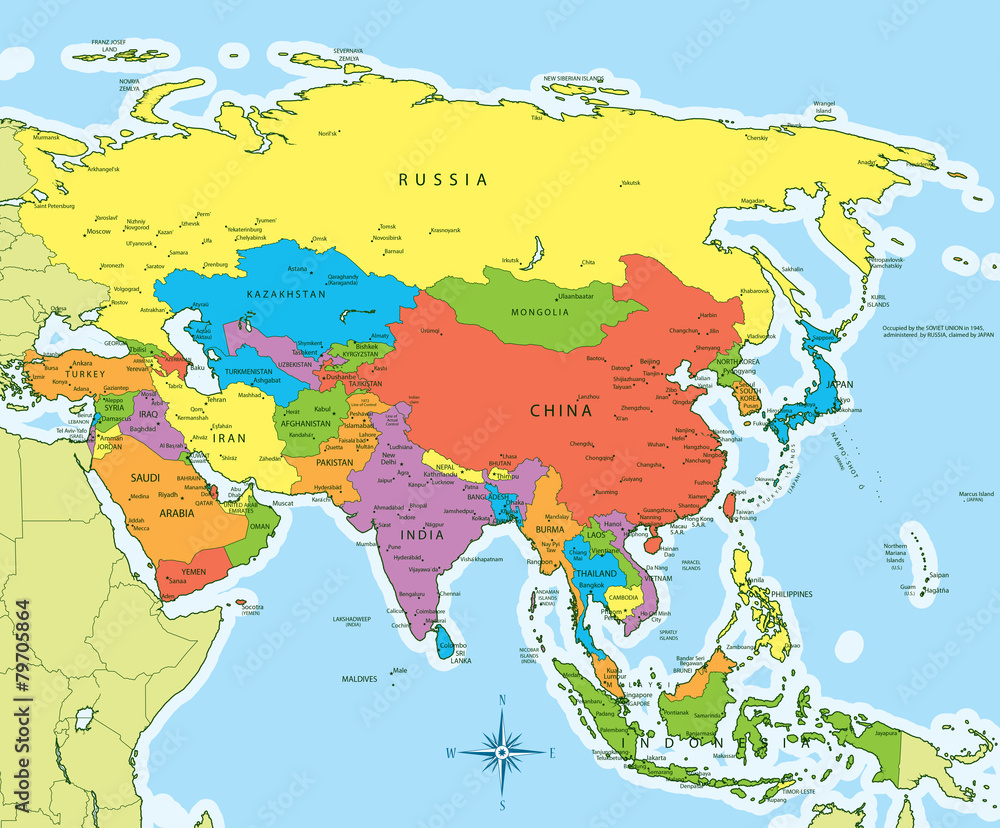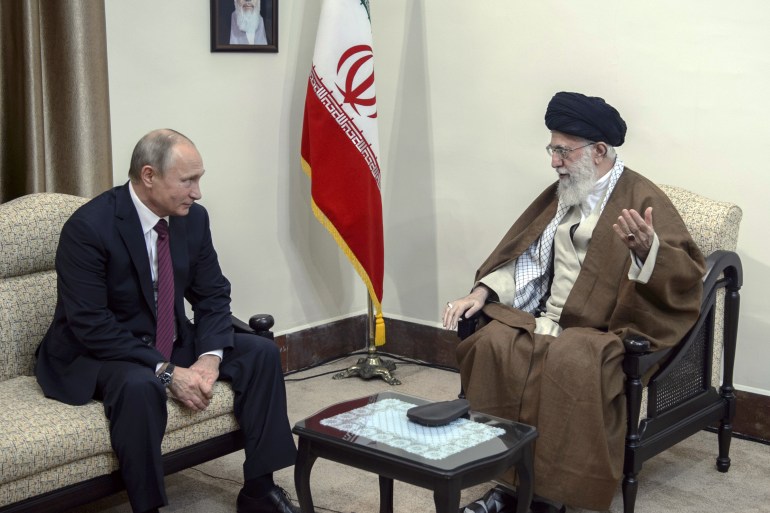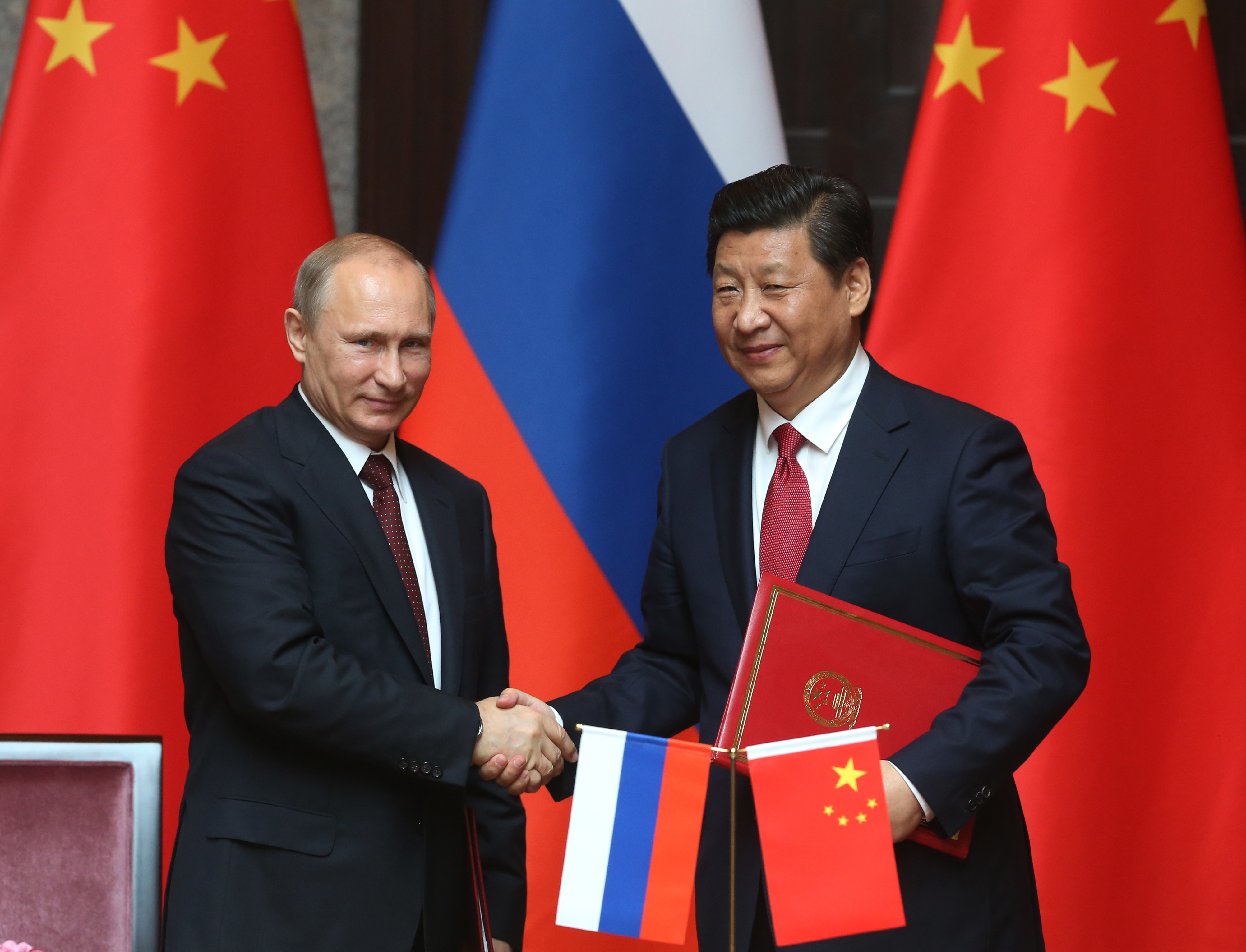Why it is up for Asian nations to begin to stand against Russian invasion of Ukraine - if these nations even want to have a deal toward Iranian and Chinese expansionisms?
When Putin launched his brutal armed invasion of Ukraine, Putin's Russia has severely broken the old structure of security order. Putin has even warned to conquer and destroy Ukraine, as well as showing eagerness to rebuild the lost Tsarist/Soviet Empire.
A number of nations have openly condemned Russia, imposing economic and political sanctions, including cutting off Russia's main source of survival - oil and gas (which was done by President Joe Biden). Still, Putin appears not being deterred by sanctions, as the Russian dictator has vowed to raze the whole Ukraine to dust to reconstitute his new empire, including his recent brutal bombarding tactics on civilian infrastructures.
Yet despite widespread condemnation against Russia by many nations, so far, countries in Africa, Asia and Latin America have been reluctant to join the band. In here, we will talk about Asia, as the detail means for - and why standing against Putin's Russia is vital for their survival.
A big continent with a difficult history
Asia is not like what Americans or Europeans tend to screw from their view only, it is not Asia only Chinese-looking East Asians and West Asia being identified as Middle East. It is a very big, the most populous continent in the world and with diverse histories, making the continent one of the richest and most sophisticated historical archives in the world.
Asian nations spanned from Turkey to Indonesia, and also involving nations that could be deemed as trans-continental for political or geographic reasons (Russia, Australia, Georgia, New Zealand, Azerbaijan, Cyprus, Armenia, Papua New Guinea and Egypt).
Because of the vast history, it is not easy to combine histories of various Asian nations into a unified singular book. However, the continent has been, for a long time, the battleground of many ancient, formidable imperial forces. Each of these states carry unique, beautiful and glossy, dark stories together, creating a mosaic that continue to shape Asia to even today.
It's also the home continent to three major ancient civilisation: China, India and Persia - the latter was the predecessor of modern Iran. Smaller nations like Japan, Syria, Vietnam, Nepal, Yemen, Iraq, Cambodia, Lebanon, Sri Lanka, Uzbekistan and Korea also have deep and ancient roots. Some of the world's greatest empires traced its origins from here, three of the scariest nightmares of the Europeans in the past were from Asia (Hunnic, Mongol and Ottoman). For centuries, Asian countries constituted over 55% of the world's economy, with two biggest economies being China and India. Some of the greatest religions in the world were established in Asia, including Islam, Christianity, Buddhism and Judaism.
As much as the Europeans may stress about their looks, it is Asia that need to be emphasised with greater importance than expected.
Who are now the players in Asia's growing conflicts?
The continent is a troublesome one. Today, it is still the same so, but this is probably the worst time. We'll talk about the main conflict, before summarising alongside with smaller conflicts.
Western Asia
In Western Asian theatre, the conflict between Iran and Saudi Arabia has taken place.
Of course, we already see allies in this war for both nations. Saudi Arabia is supported by powerful nations like the United States and its European allies. The majority of Arab and Islamic monarchies have taken side on Saudi Arabia due to its location as the home of two holy cities (Mecca and Medina) - most vocal being the UAE. Even several non-monarchies have sided with Riyadh with varied degrees, notably Pakistan (recently strained in relations), Taliban Afghanistan, Hadi's Yemen, Egypt, Sudan, the Maldives, Somalia, Albania, Chad, Senegal and Kosovo. Iran also has allies to back for her, including powerful proxies like the Houthis in Yemen, Hezbollah in Lebanon, Hamas in Palestine as well as the Shiite regimes of Iraq and Syria - the latter is led by Bashar Al-Assad, an Alawite.
These nations aren't necessary fighting for the Holy Grail of Islamic world, but also rather to expand its influence and colonial architectures.
 |
| Syrian city of Ghouta decimated by war. |
Several bloody frontiers between Iran and Saudi Arabia have already exposed the fragilities of West Asian peace. In Syria, Iran and Saudi Arabia are fighting a bloody proxy war since 2011, which saw Iran even sent soldiers to the country to aid the Syrian dictator Bashar Al-Assad. Three years later, the Houthis (a Shiite militia group) seized Sana'a, Yemen's constitutional capital - it raised alarm for Saudi Arabia and fellow Gulf Kingdoms, hence Riyadh has launched a massive military campaign and bombardment of Yemen since 2015. These nations are also struggling for power vie in Iraq, a country with a long historical discord because of Islamic sect's affiliations (60% Iraqis are Shiites, 30% are Sunnis and 10% are others). Recently, both Saudi Arabia and Iran are also clashing for power in Afghanistan, especially when Taliban reconquered the nation in September 2021, Saudi Arabia has a significant power weight behind Taliban because of Saudi Salafist teachings in the group since 1980s. Lebanon, Libya, Kashmir and even Western Sahara are also where Saudi Arabia and Iran are fighting as well.
 |
| People rushing to rescue survivors from a Saudi air strike in Yemen. |
The result of these violent wars are catastrophic. Millions of refugees from Syria, Iraq and Yemen fled elsewhere. Many children have their future ruined. Starvation and economic mismanagement combined further worsened the life of many people. Meanwhile, citizens of Saudi Arabia and Iran bear little from these tragedies since their countries are not affected.
There are also other conflicts there, but it has never reached the scales to that of Iran and Saudi Arabia. This includes Turkey's conflicts against both Iran and Saudi Arabia, Israel's proxy war with Iran, etc.
Eastern, Central and South Asia
The Eastern Asian theatre is becoming an increasing powderkeg with an uncertain future. And to make this powderkeg growing the heat, say that to China.
Under the new Xi Jinping leadership, China's assertiveness rose in a rapid level. China has begun to make overlapping territorial claims and even going as far as touching the entertainment and cartoon industries, much to the dismay of its neighbours.
 |
| China's Nine-Dash Line claim in red. Originally traced from the Republican era as Eleven-Dash Line, it was sustained and revived by the Communist-ruled People's Republic with some modification. |
Chinese aggression has been rapidly rising. It has begun to demonstrate the expansionist claims, making an Anschluss in Hong Kong and is now openly threatening Southeast Asia and the island of Taiwan, which is not even an independent country by international profile. China has also become more and more obsessed with attempts to redraw continental border, by quietly promoting nationalist hypes about territorial claims, from drawing Kazakhstan and Kyrgyzstan as parts of China, claiming Himalaya as a Chinese mountain and encroaching to Nepal despite Nepalese objection and even going as far as bullying South Korea and Japan for nonsense reasons (from boyband member's Korean War comment and anime YouTubers revealing Taiwan flag by accident). China also puts fight against Australia since the call for a coronavirus inquiry by PM Scott Morrison.
This has, in turn, uniting many Asian nations against Chinese expansionist ideology, though their attempt to mount a common coalition has been greatly fractured due to differences and even personal between-nation grievances. By far, countries like New Zealand, India, Taiwan, Japan, Australia and even Indonesia have shown sign of defiance - India, Japan and Australia are parts of the QUAD, the other being the United States (Beijing called it an Asian NATO version). Vietnam, Nepal, the Philippines, Kazakhstan, Malaysia, Kyrgyzstan, Tajikistan, Bhutan and Singapore have become critical, but fallen short from sharing a closer common voice. Some states are still ambivalent at the best, notably Thailand, Bangladesh, Sri Lanka and Laos - due to economic and political reasons.
Of course, that doesn't mean China is the only key force. North Korea and Pakistan have also been involved in conflicts, too. North Korea is still having beef with South Korea, partly due to the issues left behind by the Korean War. Meanwhile, Pakistan is also having a cold war with India over Kashmir, these nations have fought four wars, with India clinched a win and the remaining three were draws.
Russia's stance
Putin's regime has been very clear about its stance, although wavering by degrees.
When talking about the Western Asian theatre, Moscow has chosen Iran above Saudi Arabia - and this is very simple: because Iran, like Russia, is a pariah state, so a naked support is not an issue. Iran is even more isolated than Russia, because of deep distrust toward the Iranian Shiism, economic competitiveness and its revolutionary regime since 1979, by many Muslim states, most of Sunni background.
While Russia appears to have no issues with Saudi Arabia and her fellow Arab allies, Russia sees Iran as a strategic partner that can destabilise the Americans in the region. Therefore, supporting Iran fulfils Putin's goal and will put Riyadh and allies to face a dangerous compromise - as happening now in Syria, Yemen and Iraq.
This is why Moscow wasted no effort to build connection with Iranian proxies and helped Iranian troops to prompt up the authoritarian regime of Bashar Al-Assad. Putin has also embraced, in a limit, Iranian expansion as long as it can force the Americans and its NATO partners to feel exhausted. Most recently, Putin has used Iran as a bargaining chip on its nuclear deal talks with the West, which severely threatened these Kingdoms and its allies. In the mean time, the Russian invasion of Ukraine was also echoed strongly by Iran, with Tehran blamed NATO and the United States for the problem.
With both the Islamic regime in Iran and Putinist government in Russia going expansionist, this can't be received as a good thing in a long term for West Asian nations, how could Saudi Arabia, the UAE and even other nations there compromised with an Iran that gets Russian pumping?
In Eastern Asia, Putin has also enhanced his support for China, already visited Beijing during the 2022 Winter Olympics and unveiled a new alliance with "no limit". Of course, Xi Jinping's China tacitly backs the Russian invasion of Ukraine without declaring, notably by using his nationalist population in Chinese internet platform to cheer for the assault. Beijing also appears to have limited knowledge about Putin's invasion plan.
And why is Russia so happy to get China backing? This comes with no surprise though - the answer lies in Putin himself. The Russian dictator has been backing China's expansionist ideology in recent years, except for the Outer Manchurian region (which has been solved by a peace treaty). Russia has shown a greater willingness to even ditch several old time allies and strong buyers of Russian arms, by tacitly backing Chinese aggression in territorial matter. Russia could be seen as secretly advocating China to seize all of South China Sea at the expense of Vietnam, for once a strong ally of Moscow since the Soviet era. Russia has also appeared to become less friendly with India, also a long-time ally since the Soviet Union, due to Putin's ambitions are somewhat contradicted to India's interests.
Moreover, it appears Russia does not give a damn about Central Asian nations, previously colonised under the Tsarist and Soviet governments. When China fabricated its territorial claims in Central Asia, Russia gave no support for their Central Asian fellows, a sign that Russia is willing to allow Central Asia to be a part of Chinese sphere. Recently, Russia has also used its military might to threaten Japan after the Japanese government imposed harsh sanctions on Russia for invading Ukraine. It's noteworthy that Japan frequently faces Chinese and Russian jets flying near its air border, sometimes both two together.
Asian response
By far, Asian response is appalling. Except Japan, South Korea, Australia, New Zealand, Taiwan, Georgia and Singapore; rather than trying to face the new reality that Russia is advocating pariah Iran and a growing imperialist China to go belligerent mod for border redraws, these nations have chosen trying to appease Moscow instead.
For instance, Saudi Arabia and the UAE, led by de facto autocratic Crown Prince Mohammed bin Salman and President Khalifa bin Zayed Al Nahyan, snubbed Joe Biden's calls after the U.S. President tried to convince these leaders to join hand when Mr Biden sanctioned Russian oil and gas export; yet they instead accepted calls from the Russian dictator. Meanwhile, India has been criticised for refusing to condemn the Russian attack, which could be seen as a grave danger once Russia and China's alliance stands firmer and the key reason why many Indian experts are calling for the Indian government to decouple from Russia. Southeast Asia's ASEAN has been condemned "cowardice" for their refusal to openly condemn Russia - so far, only Singapore has done so and imposed sanctions. Central Asian nations, due to their unfortunate location, could not raise voices so much. Israel has tried to offer a peace talk and even its PM Naftali Bennett secretly met Putin in the Kremlin, but his Israel remains unwilling to sell Iron Dome to Ukraine. Turkey, the only West Asian nation in NATO and has a nuclear stockpile, has been more critical over Russia but it has shown no sign of standing against Russia any sooner or later.
It's time to get rid of Russia and let it drown
History has all taught us a lesson: aggressors always fail.
Russia is now going to foment a new Axis, a new fascist order. This axis order will involve the three most important powers: Russia, China and Iran - all are armed with nuclear weapons. And their allies are also emboldened to do the same, both carry weapons of mass destruction on hands. These regimes are not bound to human beings - they will unleash violence as means to achieve goals. They are very different from the United States' previous invasive wars - the United States is wrong for invading many countries, but the Americans, unlike Russian and Chinese rivals, do not claim sovereignty of these attacked countries since 1946. The U.S. attacked Vietnam in 1960s, but it never considered Vietnam a colony. The U.S. did attack Panama in 1989, but it did not consider Panama a colony. The U.S. invaded Afghanistan and Iraq but it had never declared these nations as American colonial possessions. China and Russia aren't - these governments want to restore border of their empires and do not see neighbouring states as sovereign.
The potential Iran-Russia-China axis reminds us about the past. Back in WWII, the Axis between Italy-Japan-Germany had led to the deaths of 70-80 million people. Not only that, this axis also partners with the likes of other authoritarian pro-Russian/Chinese regimes (to differ from other authoritarian pro-American allies), such as Pakistan (where an elected government doesn't even hold power and has a long history of investing in terrorism), Myanmar (governed by a military junta since 2021), North Korea and Syria, save for their allies in Europe (Belarus and Serbia), Africa (Mali) or the Americas (Venezuela, Nicaragua and Cuba).
The vis-à-vis appeasing these tyrants must stop. Illusions about Russia or China will honour their words did not occur. It's the moment of truth - face or fail. European nations have already seen the true face of China after the Lithuania-Taiwan brawl, then why not Asian nations to join at the same time?




Comments
Post a Comment